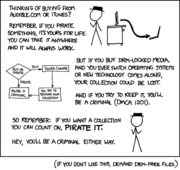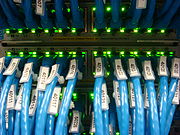Digital Rights Management and Iteration
From booktorrent
Digital Rights Management and The Concept of Iteration
Digital Rights Management, or DRM, refers to a variety of technological and software methods used to restrict end-user control of content. DRM software is currently protected by copyright law in the United States; it is perceived as an extended means of distributors protecting media from piracy/illegal distribution.
The term "DRM" can be applied to everything from EULA (end-user license agreements, "contracts" which dictate the authorized terms of media or software use before the consumer is allowed full (restricted) access to the product) to proprietary hardware measures taken. Many common uses of DRM are embedded software used to protect licensing, and product distribution.
For eBooks, this means that DRM software can —
- determine which devices a file can be read on.
- how many copies of that file can be made.
- whether that file can be uploaded online.
- ability to modify the file.
- ability to keep the file beyond a certain time limit.
Examples of eBook DRM practices can be found here, here, and here.
Iteration
The practice and widespread use of DRM is reflective of changing attitudes of what intellectual property rights entail in the 21st century. To begin with, there has to be recognition of two critical components of what the Internet allows for due to widespread and efficient distribution methods. Networked computers create and offer more efficient means of sharing and replicating information and media than ever before, on a global scale. The processes of replication and dissemination are critical components of capitalism. They offer intensively broadened markets with diverted investments in labor costs, away from the maintenance of commodity towards its generation. But current digital networks not only enable traditional producers to circumvent methods of replication, but also end-users, consumers, the proletariat, and, yes, pirates (or we can just say the lumpen-prole and have a more calm theory day), whose class functions are to consume and perpetuate commodities.
There is, then, a newly developed conflict between classes that underlies the approach to digital rights management and intellectual property rights as a whole. The notion of iteration has entered into being - that each iteration, or instance, of a file is treated as a standalone instance of that media, and is another opportunity to protect with intellectual property rights is at odds with the project of reclaiming the iterative commons that the proletariat is attempting to undergo. No product is perceived as "shared" (an oddly complete dissolution of communization by pre-empting its entrance with its demise) under this view. Rather, every iteration of it is seen as a moment, an instance, whose consumption can be mediated.
In other words, with the loss of regulating the work of replication, the resources of capital must be even more strongly directed toward regulating the work of depletion (consumption), because the moment of crisis has moved from the realignment of the worker and zir craft toward the realignment of the digital shopper and zir bootleg collection of all of "The Addams Family" with bad Russian subtitles screened into it.
Or, succintly and in terms of our class.
Iteration belies the notion of "authenticity". The process of iteration begs the questions — is my falsity worth the investment of an "original"? Or am I only to be functionalized, consumed? Is there a difference?
Iteration as expanded out toward "online" identities, the reader transformed and individualized by DRM, i need to finish this at some point.


